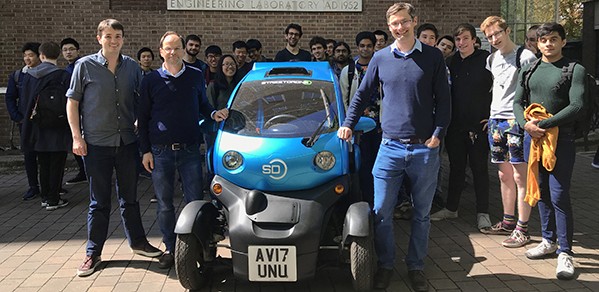
The Department of Engineering has launched a new information engineering course for second year undergraduate students with a focus on autonomous driving.
We’re delighted to launch this new course at a time when there is a desperate shortage of engineers who are familiar with computer vision, deep learning and reinforcement learning.
Professor Roberto Cipolla
The course aims to provide a unified view of information engineering, showing how signal processing, computer vision, machine learning and control relate to one another.
The new syllabus is a response to the need to address the global shortage of engineers who are familiar with computer vision, deep learning and reinforcement learning, at a time when the industry is growing rapidly.
As part of the course, example applications are drawn from autonomous driving, and guest lecturers from industry will introduce the students to the anatomy of a self-driving car and its autonomous driving hardware (including sensors, interfaces, actuators, and the car itself). The course is taught by Professor Roberto Cipolla, Dr Richard Turner and Dr Glenn Vinnicombe. Among the guest lecturers invited to talk as part of the new course are Dr Alex Kendall, alumnus and co-founder of Wayve, and his colleague Dr Jeffrey Hawke. They recently brought along two of their self-driving cars to the Department and gave a demonstration to the students.
Wayve is a Cambridge-based machine learning company that has been testing its self-driving cars on the city’s roads since January 2018. It was founded in 2017 by Dr Kendall, Research Fellow in Computer Vision and Robotics, who completed his PhD in Professor Cipolla’s group, and Dr Amar Shah, who completed his PhD in Professor Zoubin Ghahramani’s Machine Learning group.
Professor Cipolla said: “We’re delighted to launch this new course at a time when there is a desperate shortage of engineers who are familiar with computer vision, deep learning and reinforcement learning. We use the example application of autonomous driving to provide a real-world case study of important concepts and sub-areas of information engineering. This course also aims to equip students with the ability to solve simple computer vision and machine learning problems, including object detection and segmentation, and sequential decision-making.”

